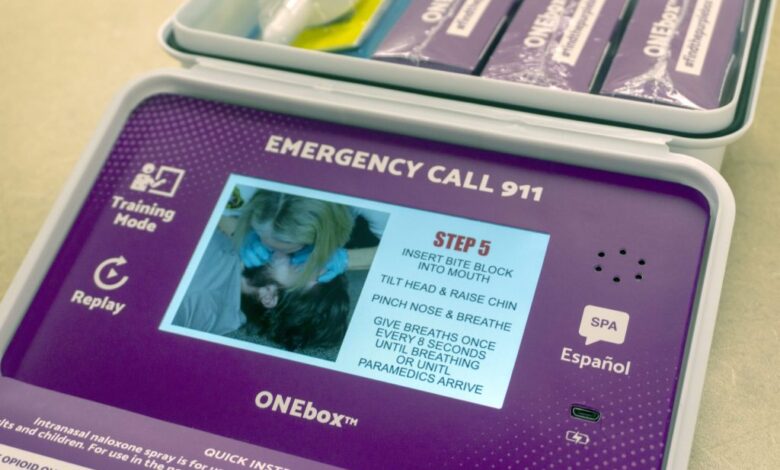Wilson County deploys overdose reversal kits to combat epidemic of opioid deaths


By Jaymie Baxley
Small purple boxes have become a promising tool in Wilson County’s fight to lessen the deadly toll of the opioid epidemic.
ONEbox is a first aid-like kit that contains doses of naloxone, a nasal spray that can rapidly reverse the effects of opioid overdose. When the kit is opened, a screen embedded in the lid plays a video of a paramedic giving step-by-step instructions for administering the drug.
“Let’s take a deep breath,” says the woman in the video, speaking in either English or Spanish, depending on the language selected. “Step No. 1 is to check to see if somebody really is unresponsive. You can do that by gently shaking them or shouting, or you can use your knuckles against the sternum to see if you get a reaction.”
Dozens of the kits have been placed in strategic locations throughout Wilson County in recent weeks. Jeff Hill, executive director of the Wilson County Substance Prevention Coalition, said he wants the boxes to become so ubiquitous that “any layman will know what it is, know how to identify it and know how to use it.”
“At the end of the day, we understand that anybody in the right place, right time and right scenario can become, or needs to become, a first responder,” he said. “Wherever I can’t be, a ONEbox can — and that could be the difference between life and death.”

‘Community of first responders’
Hill first encountered ONEbox at a conference last year in Washington, D.C. Impressed with the kit’s lifesaving potential, he brought back a sample to show county officials.
“My initial reaction was, ‘Wow, it is so compact and it gives you everything that you need — all the tools that you need — to help save a life,’” said Lori Winstead, deputy manager for Wilson County. “With this system, you kind of avoid that fear of not knowing what step comes next. It puts you at ease, and that’s important in an emergency situation.”
At the time, Winstead was working on a spending plan for Wilson County’s first tranche of funding from a landmark settlement with the pharmaceutical companies that stoked the national opioid epidemic. Money from the settlement, which brings $7.5 million to the county over the next 18 years, can only be spent on services and strategies that address the crisis.
ONEbox fit the bill. In April 2023, the Wilson County Board of Commissioners agreed to buy 200 kits for $40,000. Hill’s coalition received the kits in February and began distributing them to local nonprofits, government agencies and businesses such as Casita Brewing Co. and Thomas Drug Store.
He said the demand was “greater than we expected.” The coalition ran through its initial supply within three weeks, prompting the county to order another shipment of 200 kits.
“I think it caught on so fast because the community bought into being a resource,” said Hill, adding that Wilson is the first county to deploy the kits in North Carolina. “Our quote here in Wilson County is ‘we’re a community of first responders, not a community dependent on them.’”
Unlike many of the state’s rural counties, Wilson has seen a decrease in fatal overdoses. The latest available data from the N.C. Department of Health and Human Services shows that Wilson County had 30 overdose deaths in 2022, down from 37 deaths a year earlier.
The use of naloxone rose over the same period. The Wilson Times reported that local paramedics administered naloxone to 105 patients in 2022, a 34 percent increase from the previous year. That number does not include doses administered by other public safety agencies and civilians.
Hill said the kits are part of a larger effort to improve community access to lifesaving interventions. He noted that Wilson County’s Board of Education approved a policy last May requiring every school in the district to keep a supply of naloxone.
“That’s very rare because most people would view that as, ‘Oh, no, we have a drug problem,’” he said. “That’s not what our school system is saying. What they’re saying is the same way we have an AED and a first aid kit on site, God forbid, in case of emergency, we want to make sure that we have naloxone to protect the sanctity […] and the livelihood of our students.”
Another example, he said, is Wilson Professional Services, a local medication-assisted addiction treatment center that offers free naloxone to anyone who requests it. The facility also provides training so people know how to properly administer the drug.
Naloxone has been readily available for years at community hubs like the Wilson County Public Library, where a staff member used it to save the life of a man who overdosed in 2022.

Creating a model
The county’s swift adoption of ONEbox has not gone unnoticed by the kits’ distributor, the West Virginia Drug Intervention Institute.
“Wilson has certainly been one of the more comprehensive approaches that we’ve seen,” said Susan Bissett, president of the institute. “They’re using the libraries. They have them in bars and restaurants. They’re working with the schools and the local higher education facilities.”
Bissett traveled to Wilson County with a film crew last month to record testimonials from local leaders. The recordings, she said, are meant to show other communities how to successfully implement the kits.
“To see another Appalachian community embrace this has been incredible,” she said. “The fact that it is a more rural community — and how they’re making sure that boxes are in locations strategically placed throughout the community so that bystanders can respond — is incredible.”
Her comments were echoed by Joe Murphy, creator of ONEbox. Murphy said he came up with the idea after seeing his small West Virginia hometown “ravaged by drugs.”
“The way that every single organization we’ve talked to in this community has embraced it, from law enforcement to the public sector, is unbelievable,” he said. “You just don’t see this anywhere in the country.”

Hill believes Wilson County could be a bellwether for other communities in North Carolina. He said officials from neighboring counties have already expressed interest in deploying ONEbox kits based on the successful rollout in Wilson.
“The goal is to create a model that can be replicated,” he said.
The post Wilson County deploys overdose reversal kits to combat epidemic of opioid deaths appeared first on North Carolina Health News.
